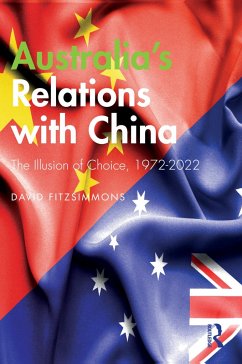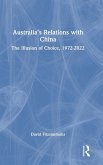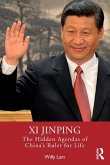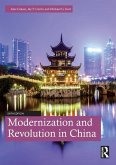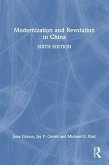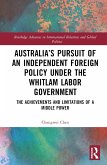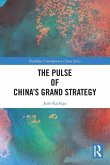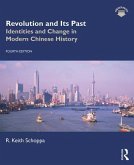Drawing on a wealth of interviews with more than fifty key stakeholders from Australia and China, including five former Australian Prime Ministers, Fitzsimmons presents a history and analysis of Australian-Chinese relations since 1972.
Fitzsimmons systematically examines how Canberra formulates and implements Australia's China policy, and how PMs and key influencers have made that policy over the last fifty years. Next, it analyses the style, manner and effectiveness of Australian Prime Ministers and other key foreign-policy makers in making Australian policy on China. Next, it charts how Australian policy on China has changed over different political periods. It also highlights Australian policy to China as a global case study for other countries who are closely examining and learning lessons from how one Asia-Pacific middle-power has dealt with the Chinese colossus.
An essential guide for students of Australia's international relations, as well as for scholarsof international relations more broadly.
Fitzsimmons systematically examines how Canberra formulates and implements Australia's China policy, and how PMs and key influencers have made that policy over the last fifty years. Next, it analyses the style, manner and effectiveness of Australian Prime Ministers and other key foreign-policy makers in making Australian policy on China. Next, it charts how Australian policy on China has changed over different political periods. It also highlights Australian policy to China as a global case study for other countries who are closely examining and learning lessons from how one Asia-Pacific middle-power has dealt with the Chinese colossus.
An essential guide for students of Australia's international relations, as well as for scholarsof international relations more broadly.
"This book provides a deeply-researched and clearly-presented account of the way successive Prime Ministers have conceived and managed ties with Beijing since relations were opened in 1972. As Australia debates its future relations with China, it offers a timely and invaluable guide to the way those relations have evolved, and the crucial role that national leaders have played in that process"---Hugh White, author of The China Choice
"Australia's relations with China, at a time when fresh perspectives and thought-provoking ideas on this issue are much needed. Examining differences in the approach to the relationship by successive Australian Prime Ministers from Hawke to Morrison, his big provocation comes in a final chapter, "Imagining an Australia China Security Treaty Agreement", in which he floats the idea that Australia could seek to sign a defence treaty with China. He frames it as an application of the Keating concept that we should find our security in, not from, Asia. Some will find its application to China objectionable, and indeed some even objected to Keating's defence agreement with Indonesia. But I urge those concerned to see more thinking and less dogma in the discussion of Australian foreign policy to read it through, and think about it. The implications force our attention to realities in our foreign landscape that most Australian politicians, even if they think about them, would rather not discuss."---Steven FitzGerald, Australia's first Ambassador to China between 1973 and 1976
"Fitzsimmons opens and closes with the metaphor of the panda and the koala. He presents a powerful narrative woven together from an impressive array of oral history accounts from first-hand observers and participants involved in shaping Australia's foreign policy towards China over five decades. Ranging through the prime ministerships of Whitlam to Morrison, this book goes a long way to explain the trajectory of Australia's engagement with China and how it ended up with the conundrum of the 2020s; increasingly challenged, striving to reconcile its 'fear and greed': the dialectic of Australia's security ties and economic interests. His response is a synthesis: a thoughtful third approach" ---John Blaxland, Professor of International Security and Intelligence Studies at Australia National University
"David Fitzsimmons has written a comprehensive and timely analysis of the evolution of Australia-China relations since Gough Whitlam. His book grapples with the complexities of decision-making in our Westminster system and in particular the central role of Prime Ministers in managing key foreign relationships such as China and the United States, with the support of the Foreign Minister, senior officials, and personal staff. It is a reminder of the key role of personal relationships in diplomacy against the backdrop of structural changes which shape the environment in which leaders exercise agency. What comes through clearly is that the Australian leaders surveyed here have tackled the China relationship with serious purpose firmly grounded in the national interest. The challenge being how to deal with the rise of China in the context of our alliance with the United States and our aspirations to maintain and, where possible, strengthen the global rules-based order. This is not to contain China but to create an equilibrium in the Indo-Pacific that respects the sovereignty and national interests of all countries, large and small. Recent developments such as the QUAD leaders' meetings and AUKUS have not exhausted the scope for creative Australian diplomacy in our region, as is now being demonstrated by the renewed focus on relations with the Pacific islands and South East Asia. We should be optimistic about the future; Australia is an agile middle power with plenty of scope to punch above its weight in the Indo-Pacific"---Arthur Sinodinos, Australia's Ambassador to the United States of America
"David Fitzsimmons has provided a much-needed fine-grained account of Australia's policy making processes in relation to its diplomatic relationship with China. Focusing in on the impact of Prime Ministers on the relationship, he provides the first detailed account of the inner workings of the process of building the bilateral relationship, and then its dramatic unravelling. Rich with archival material and eyewitness observations, this book is essential reading for anyone with more than a passing interest in Australia's relationship with its largest trading partner" --- Michael Wesley, author of, There goes the Neighbourhood: Australia and the Rise of Asia.
"Fitzsimmons' book is a welcome addition to the growing literature on Australia-China relations. This is a scholarly attempt to derive patterns, uncover behind-the-scenes deliberations, as much as to acknowledge how external environments provide the contexts for policy debates and formulations. Clearly, the analysis contained the book recognizes the crucial importance of taking neo-classic realism seriously, where policymakers engage in debates in aligning available resources and policy instruments with national interests and objectives. In this regard, the book offers a useful recipe for contextualising Australia's China policy in both historical and structural terms. Australia's experiences, as the author suggests, should be viewed as a global case study for countries, in particular those middle powers that maintain alliance ties with the US but have also developed extensive economic interdependence with China, that will have to navigate between the two superpowers, to preserve and promote their national interests" --- Jingdong Yuan, Associate Professor at the University of Sydney
"Australia's relations with China, at a time when fresh perspectives and thought-provoking ideas on this issue are much needed. Examining differences in the approach to the relationship by successive Australian Prime Ministers from Hawke to Morrison, his big provocation comes in a final chapter, "Imagining an Australia China Security Treaty Agreement", in which he floats the idea that Australia could seek to sign a defence treaty with China. He frames it as an application of the Keating concept that we should find our security in, not from, Asia. Some will find its application to China objectionable, and indeed some even objected to Keating's defence agreement with Indonesia. But I urge those concerned to see more thinking and less dogma in the discussion of Australian foreign policy to read it through, and think about it. The implications force our attention to realities in our foreign landscape that most Australian politicians, even if they think about them, would rather not discuss."---Steven FitzGerald, Australia's first Ambassador to China between 1973 and 1976
"Fitzsimmons opens and closes with the metaphor of the panda and the koala. He presents a powerful narrative woven together from an impressive array of oral history accounts from first-hand observers and participants involved in shaping Australia's foreign policy towards China over five decades. Ranging through the prime ministerships of Whitlam to Morrison, this book goes a long way to explain the trajectory of Australia's engagement with China and how it ended up with the conundrum of the 2020s; increasingly challenged, striving to reconcile its 'fear and greed': the dialectic of Australia's security ties and economic interests. His response is a synthesis: a thoughtful third approach" ---John Blaxland, Professor of International Security and Intelligence Studies at Australia National University
"David Fitzsimmons has written a comprehensive and timely analysis of the evolution of Australia-China relations since Gough Whitlam. His book grapples with the complexities of decision-making in our Westminster system and in particular the central role of Prime Ministers in managing key foreign relationships such as China and the United States, with the support of the Foreign Minister, senior officials, and personal staff. It is a reminder of the key role of personal relationships in diplomacy against the backdrop of structural changes which shape the environment in which leaders exercise agency. What comes through clearly is that the Australian leaders surveyed here have tackled the China relationship with serious purpose firmly grounded in the national interest. The challenge being how to deal with the rise of China in the context of our alliance with the United States and our aspirations to maintain and, where possible, strengthen the global rules-based order. This is not to contain China but to create an equilibrium in the Indo-Pacific that respects the sovereignty and national interests of all countries, large and small. Recent developments such as the QUAD leaders' meetings and AUKUS have not exhausted the scope for creative Australian diplomacy in our region, as is now being demonstrated by the renewed focus on relations with the Pacific islands and South East Asia. We should be optimistic about the future; Australia is an agile middle power with plenty of scope to punch above its weight in the Indo-Pacific"---Arthur Sinodinos, Australia's Ambassador to the United States of America
"David Fitzsimmons has provided a much-needed fine-grained account of Australia's policy making processes in relation to its diplomatic relationship with China. Focusing in on the impact of Prime Ministers on the relationship, he provides the first detailed account of the inner workings of the process of building the bilateral relationship, and then its dramatic unravelling. Rich with archival material and eyewitness observations, this book is essential reading for anyone with more than a passing interest in Australia's relationship with its largest trading partner" --- Michael Wesley, author of, There goes the Neighbourhood: Australia and the Rise of Asia.
"Fitzsimmons' book is a welcome addition to the growing literature on Australia-China relations. This is a scholarly attempt to derive patterns, uncover behind-the-scenes deliberations, as much as to acknowledge how external environments provide the contexts for policy debates and formulations. Clearly, the analysis contained the book recognizes the crucial importance of taking neo-classic realism seriously, where policymakers engage in debates in aligning available resources and policy instruments with national interests and objectives. In this regard, the book offers a useful recipe for contextualising Australia's China policy in both historical and structural terms. Australia's experiences, as the author suggests, should be viewed as a global case study for countries, in particular those middle powers that maintain alliance ties with the US but have also developed extensive economic interdependence with China, that will have to navigate between the two superpowers, to preserve and promote their national interests" --- Jingdong Yuan, Associate Professor at the University of Sydney

